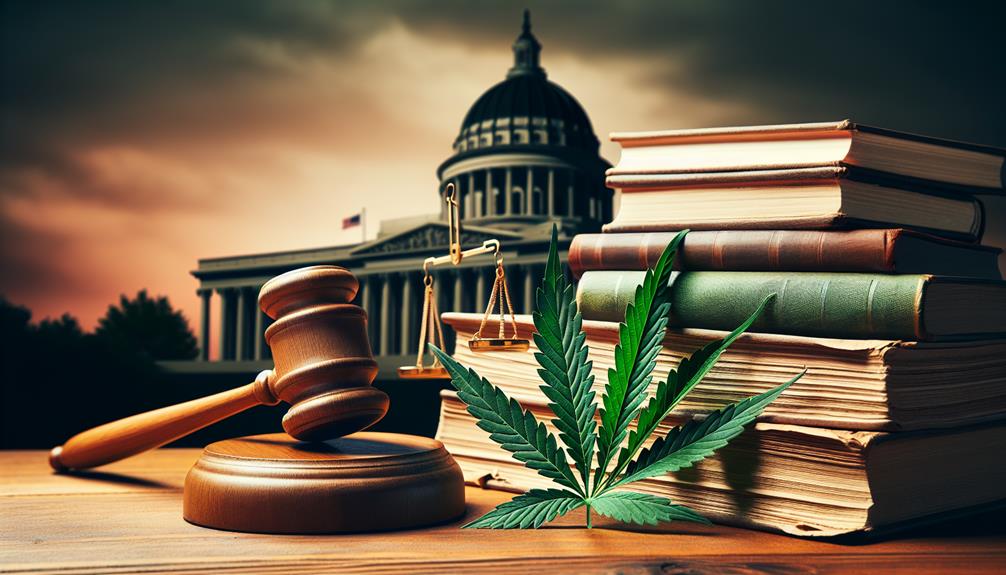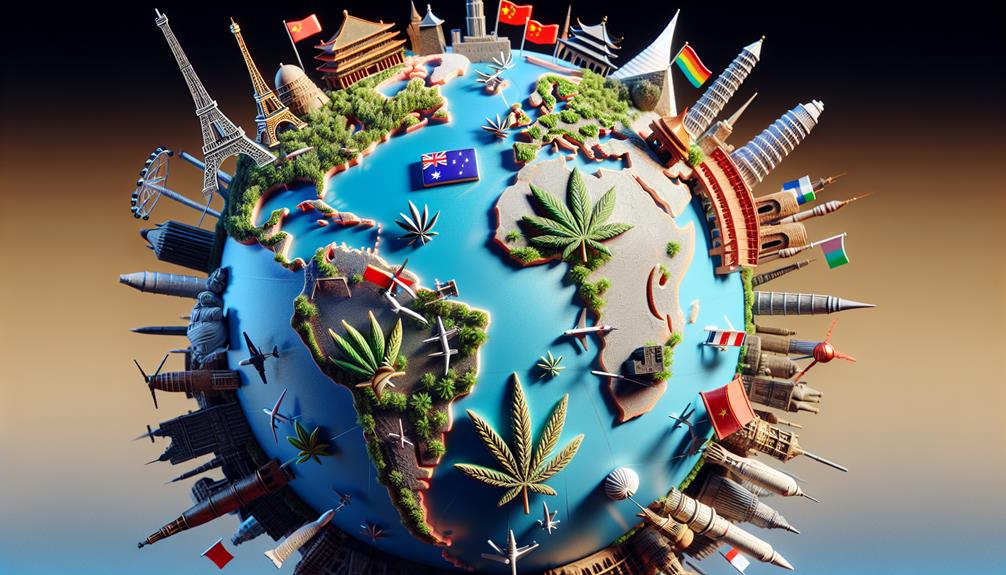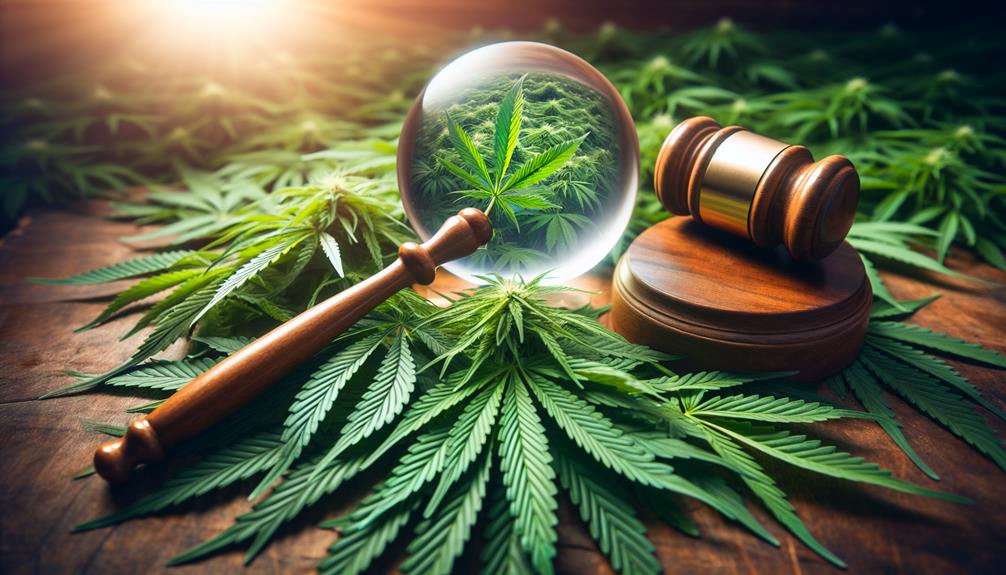As you navigate the ever-shifting sands of the CBD legal landscape, you'll find that the clarity you seek is often shrouded in a mist of regulations and reinterpretations. Federally, you're in the clear as long as your CBD products are derived from hemp and contain no more than 0.3% THC, but don't let this federal threshold lull you into a false sense of security. Each state has taken the reins in steering their own course, creating a patchwork of laws that could either open doors or erect barriers depending on where you stand. The FDA's cautious dance around the issue adds another layer of complexity, especially when it comes to consumables. So, as you consider the opportunities and pitfalls in this burgeoning market, remember that the only constant in the realm of CBD is change—and it's this dynamic nature that might just pique your curiosity to explore further.
CBD: Understanding the Basics
CBD, a non-psychoactive cannabinoid derived primarily from hemp, has gained legal acceptance under federal law, provided it contains less than 0.3% THC. This threshold distinguishes hemp-derived CBD from CBD derived from marijuana. The cannabis plant produces numerous compounds, but CBD and THC are the most recognized. Unlike THC, CBD doesn't induce intoxication, which has led to its federal legality through the 2018 Farm Bill.
The therapeutic potential of CBD is backed by scientific research, and it's FDA-approved for certain medical conditions. However, the vast landscape of CBD products, ranging from oils to edibles, remains largely unregulated. This poses concerns about the purity, safety, and labeling accuracy of CBD items on the market. You're urged to scrutinize products and seek reliable brands that provide evidence of independent testing.
When considering CBD, understanding the difference between hemp-derived CBD and marijuana-derived CBD is crucial. Industrial hemp, legally defined as having a THC content of no more than 0.3%, is the primary legal source of CBD. This composition complies with federal guidelines and allows for legal cultivation and use, while fostering a burgeoning industry around hemp-derived CBD.
Historical Legislation Impacting CBD
The 2018 Farm Bill marked a pivotal shift in the legal status of hemp, thereby significantly influencing the accessibility and commercialization of CBD products. This landmark legislation redefined hemp as an agricultural commodity and distinguished it from marijuana, based on its low THC content. By legalizing the cultivation of hemp containing less than 0.3% THC, the Farm Bill effectively altered the federal legal status of CBD derived from hemp.
To keep you engaged, consider these critical points:
- The Farm Bill federally legalized hemp-derived CBD, but state laws can differ greatly.
- Historical legislation impacting CBD often hinges on the differentiation between hemp and marijuana.
- The Food and Drug Administration (FDA) still grapples with how to regulate CBD products.
- State-level regulations continue to evolve, creating a patchwork of laws affecting CBD commerce.
Analyzing the situation, it's clear that while the Farm Bill set the stage for CBD's growth, the lack of uniform FDA regulations has left consumers and businesses navigating a complex legal environment. As you forge ahead in understanding CBD's place in the market, remember that historical legislation like the Farm Bill has been instrumental yet is only part of the evolving story of CBD's legal journey.
Current Federal CBD Regulations

Despite the Farm Bill's significant changes, current federal regulations for CBD remain mired in ambiguity, with the FDA still formulating guidelines for its safe inclusion in consumer products. You're navigating a legal landscape of CBD that, at the federal level, is still taking shape. The FDA's role in this evolving regulatory framework is critical, yet the agency hasn't finalized its stance on the integration of CBD into the food and drug markets. This leaves you in a state of uncertainty when considering the production, marketing, or consumption of CBD-based products.
CBD derived from hemp containing less than 0.3% THC is federally legal; however, the FDA has not greenlit CBD for human consumption outside of approved pharmaceuticals. This discrepancy creates a patchwork of enforcement at the state level, adding layers of complexity to the industry's compliance efforts. As a stakeholder or consumer, you must stay abreast of both the federal landscape and individual state regulations, which often diverge significantly.
Your understanding of CBD at the federal level must include an awareness of the ongoing dialogue between the FDA, public health authorities, and industry representatives. Their collaboration is pivotal in establishing a clear regulatory framework that ensures safety, standardization, and legal clarity for CBD products.
State-by-State Legal Variances
You must navigate a patchwork of regulations when dealing with CBD and Delta-8 THC, as legal stances vary significantly across states. This variability means you'll encounter differing levels of restriction on sale and distribution, which directly impacts your business operations and consumer access. It's crucial to stay informed about these interstate legal discrepancies and the nuances of CBD regulation to ensure compliance and strategic decision-making.
Interstate Legal Discrepancies
Navigating the patchwork of state regulations, businesses and consumers must stay informed about the varying legal statuses and restrictions on CBD and cannabis products across the United States. As you move from one state to another, the legal landscape surrounding CBD shifts, often leaving companies face to face with a perplexing gray area.
- State Regulations: Disparate laws can mean a product legal in one state may be illegal just across the border.
- Market Access: Varying degrees of market access impact where companies can sell and what products are available to consumers.
- Compliance Challenges: Keeping up with different state requirements demands diligence and resources.
- Advocacy Efforts: Groups like CANNRA work towards harmonizing these legal variances, advocating for standardized regulations.
Understanding these intricacies is critical for navigating the fragmented legal terrain of the CBD industry in the United States.
CBD Regulation Nuances
State-by-state CBD regulation nuances reflect a mosaic of legal stances, ranging from full acceptance to strict prohibition, which businesses and consumers must carefully decipher to remain compliant. As you navigate this complex terrain, understand that Health Law plays a significant role in shaping the public health response to CBD products. Some states align closely with the Drug Administration (FDA) guidelines, which do not recognize CBD as a legal food additive, while others have carved out their legal pathways.
CANNRA's influence is pivotal in harmonizing these regulations, advocating for standardized practices. You're tasked with staying informed about the shifting legalities in each state, as the legal status of CBD disrupts uniformity across the nation. Failure to do so could lead to inadvertent legal violations, despite the most well-intentioned compliance efforts.
International CBD Law Overview

The legal status of CBD internationally is a complex tapestry, varying widely as nations grapple with evolving perspectives on cannabis and its derivatives. Your understanding of the international CBD law overview is crucial whether you're a consumer, producer, or investor in the global CBD market.
- Diverse legal frameworks: No two countries approach CBD legislation identically, reflecting a spectrum of legal attitudes toward cannabis-related products.
- Health considerations: Public health policies heavily influence CBD regulation, with many nations weighing the compound's therapeutic benefits against potential risks.
- Evolving regulations: As scientific research progresses, international laws are constantly adapting, making it essential to stay informed on the latest legal changes.
- Market implications: The legality of CBD affects cross-border trade and investment opportunities within the burgeoning global CBD market.
You'll find that while CBD is legal at the federal level in some places if derived from hemp with less than 0.3% THC, other countries have stringent laws or even complete bans. Staying abreast of these regulations is vital for compliance and participation in the international arena of CBD health and wellness products. As the dialogue around cannabis continues, expect to see ongoing shifts in the legal landscape that will shape the future of the CBD industry.
Legal Challenges and Court Cases
Understanding the international CBD law overview sets the stage for unraveling the complex role that court cases have played in defining the nuances of CBD legality and regulation. As you delve into the landscape, you'll see that legal challenges and court cases have been pivotal in sculpting the current state of CBD affairs.
Court decisions across jurisdictions have constructed a patchwork of regulations that manufacturers, consumers, and lawmakers navigate. These legal challenges often revolve around whether a product is derived from hemp with low THC content or from marijuana, which remains federally illegal in many places. This distinction is crucial as it influences the legality of the product's interstate commerce.
Ongoing litigation continues to shape the conversation around CBD vs THC and the emergence of novel cannabinoids. These cases don't just determine the current legal environment but also set precedents that will impact future regulation and enforcement.
Here's a snapshot of the legal terrain influenced by key court cases:
| Aspect | Impact of Court Cases |
|---|---|
| Product Regulation | Defined permissible THC levels in CBD products |
| Interstate Commerce | Clarified legal transport of hemp-derived CBD |
| CBD vs THC Classification | Distinguished legal status based on origin |
| Novel Cannabinoids | Addressed regulatory gaps for new compounds |
Your understanding of these issues will be more comprehensive as you consider how each court case contributes to the evolving legal framework surrounding CBD.
Future of CBD Legislation

As legislative frameworks evolve, your grasp of CBD's future depends on recognizing how emerging regulations will shape the market and define legal boundaries. The future of CBD legislation is a dynamic and influential factor that will determine how you can purchase products, explore opportunities, and make informed decisions within this industry.
- Regulation and Safety: Expect stricter guidelines to ensure the safety and quality of CBD products, especially as intoxicating compounds like Delta-8 THC gain popularity.
- State-by-State Variance: Prepare for a patchwork of state laws that may require nuanced understanding to navigate the legalities of CBD purchase and use.
- Research and Evidence: Increased research into long-term health effects will likely inform future legislation, promoting consumer safety and product reliability.
- Industry Collaboration: Watch for the significant role of organizations like CANNRA in shaping evidence-based policies through stakeholder collaboration.
As a stakeholder in the CBD space, it's essential to stay informed about these developments. The absence of uniform federal guidelines means that the nuances of state regulations can significantly impact the availability and legality of CBD products. The intoxicating effects of certain hemp-derived products will continue to challenge regulators, necessitating a careful balance between access and safety. Your awareness of these legal shifts is crucial as you engage with the evolving CBD marketplace.
Frequently Asked Questions
Is CBD Legal Under US Federal Law?
Yes, CBD is legal under US federal law, provided it's derived from hemp with less than 0.3% THC. However, you're facing regulatory confusion due to state versus federal discrepancies. The FDA's jurisdiction over ingestible products adds layers of complexity, and drug scheduling debates continue to evolve. Agricultural implications from the 2018 Farm Bill further complicate the landscape, highlighting the need for clarity in the regulations governing CBD's legality.
When Did CBD Become Legal?
You're on a wild ride through time, aren't you? CBD became legal back in 2018, when hemp waved goodbye to its rowdy cousin, marijuana. Thanks to the Farm Bill, it's been quite a party for CBD origins and medical studies. Market growth skyrocketed, even as international laws keep playing catch-up. Navigating this maze requires Sherlock-level deduction, because while hemp's enjoying the limelight, the rules are as clear as mud.
Can CBD Be Taken Across State Lines?
You're facing a murky scenario when taking CBD across state lines due to varying transportation regulations. TSA policies may allow certain products, but the impact of the Agricultural Act and ongoing drug scheduling debates complicate matters. Interstate commerce challenges arise, as each state's stance can differ significantly. It's crucial to be informed and precise in your understanding of these regulations to navigate the complexities legally.
Is CBD a Controlled Substance?
You're navigating the murky waters of CBD restrictions, aren't you? CBD itself isn't a controlled substance, provided it's sourced from hemp derivatives with a THC content under 0.3%. But tread cautiously; drug scheduling varies by location, and without federal guidance on medicinal claims, you're in a gray area. Stay informed and precise in your understanding to ensure you're on the right side of the law.
